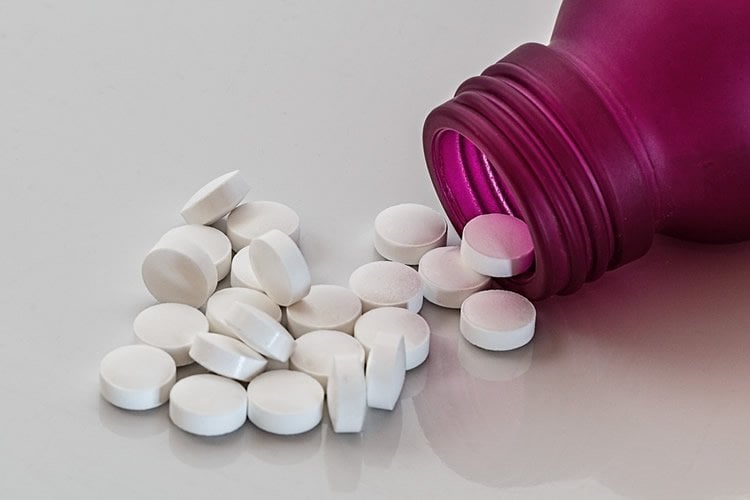Summary: According to researchers, ibruprofen can reduce neuroinflammation and improve congitive function in mouse models of FASD.
Source: Ohio State University.
An anti-inflammatory drug may have the potential to stall the damaging effects of alcohol on the fetal brain, a new study suggests.
Ibuprofen reduced neuroinflammation and behavioral signs of alcohol exposure in a rat model of fetal alcohol spectrum disorders (FASD).
The study was the first to directly link alcohol-induced inflammation in the hippocampus to cognitive impairment later in the life, said Derick Lindquist, senior author and a professor of psychology at The Ohio State University.
The findings, which appear in the journal Behavioural Brain Research, could have eventual implications reaching beyond fetal alcohol spectrum disorders, because neuroinflammation is a hallmark of many neurological diseases, he said.
In humans, fetal exposure to alcohol can lead to a cluster of life-altering problems including trouble learning, remembering and paying attention. Though estimates are imprecise, experts estimate that as many as two to five of every 100 U.S. schoolchildren have lasting problems resulting from early alcohol exposure, according to the Centers for Disease Control and Prevention.
Recent related research showed that neuroinflammation soon after birth can impair learning and memory later in life and that anti-inflammatory treatment has the power to prevent those impairments.
In this study, Lindquist and his co-authors set out to examine the role of neuroinflammation in the development of fetal alcohol spectrum disorders and cognitive dysfunction.
Some of the animals in the study were exposed to alcohol four to nine days after birth – the scientific equivalent of the third trimester in a human pregnancy. Alcohol-exposed rats given ibuprofen had lower levels of inflammation in the brain than those given saline solution. Twenty-five days later they also exhibited enhanced long-term memory.

The research helps define the role of the brain’s immune system — and of inflammation in particular — in the development of cognitive dysfunction after fetal alcohol exposure, Lindquist said.
While it’s too soon to speculate on implications in humans, it could pave the way for future research into potential treatments for fetal alcohol spectrum disorders and other neurological problems, said lead author Molly Goodfellow, who worked on the study as an Ohio State graduate student and is now at the University of Maryland.
“We hope that our work will promote future studies to determine how long neuroinflammation persists after alcohol exposure and if anti-inflammatory therapies might work if administered after birth or later in life to improve cognitive function in people with FASD.”
Lindquist and Goodfellow said it’s important to note that ibuprofen is generally not recommended for pregnant women because of risks to the mother and the fetus.
“At this point in our study, the ibuprofen is kind of like using a sledgehammer to reduce neuroinflammation. It’s possible other anti-inflammatory drugs could have similar pro-cognitive effects with less risk,” Lindquist said.
Youn Ju Shin, a neuroscience researcher at Ohio State, also worked on this study.
Source: Derick Lindquist – Ohio State University
Publisher: Organized by NeuroscienceNews.com.
Image Source: NeuroscienceNews.com image is in the public domain.
Original Research: Abstract for “Mitigation of postnatal ethanol-induced neuroinflammation ameliorates trace fear memory deficits in juvenile rats” by Molly J. Goodfellow, Youn Ju Shin, and Derick H. Lindquist in Behavioral Brain Research. Published online October 5 2017 doi:10.1016/j.bbr.2017.09.047
[cbtabs][cbtab title=”MLA”]Ohio State University “Ibruprofen May Block Damage From Fetal Alcohol Exposure.” NeuroscienceNews. NeuroscienceNews, 14 November 2017.
<https://neurosciencenews.com/fetal-alcohol-ibruprofen-7942/>.[/cbtab][cbtab title=”APA”]Ohio State University (2017, November 14). Ibruprofen May Block Damage From Fetal Alcohol Exposure. NeuroscienceNews. Retrieved November 14, 2017 from https://neurosciencenews.com/fetal-alcohol-ibruprofen-7942/[/cbtab][cbtab title=”Chicago”]Ohio State University “Ibruprofen May Block Damage From Fetal Alcohol Exposure.” https://neurosciencenews.com/fetal-alcohol-ibruprofen-7942/ (accessed November 14, 2017).[/cbtab][/cbtabs]
Abstract
Mitigation of postnatal ethanol-induced neuroinflammation ameliorates trace fear memory deficits in juvenile rats
Impairments in behavior and cognition are common in individuals diagnosed with fetal alcohol spectrum disorders (FASD). In this study, FASD model rats were intragastrically intubated with ethanol (5 g/kg/day; 5E), sham-intubated (SI), or maintained as naïve controls (NC) over postnatal days (PD) 4–9. Ethanol exposure during this human third trimester-equivalent period induces persistent impairments in hippocampus-dependent learning and memory. The ability of ibuprofen (IBU), a non-steroidal anti-inflammatory drug, to diminish ethanol-induced neuroinflammation and rescue deficits in hippocampus-dependent trace fear conditioning (TFC) was investigated in 5E rats. Phosphate buffered saline vehicle (VEH) or IBU was injected 2 h following ethanol exposure over PD4-9, followed by quantification of inflammation-related genes in the dorsal hippocampus of PD10 rats. The 5E-VEH rats exhibited significant increases in Il1b and Tnf, but not Itgam or Gfap, relative to NC, SI-VEH, and 5E-IBU rats. In separate groups of PD31-33 rats, conditioned fear (freezing) was significantly reduced in 5E-VEH rats during TFC testing, but not acquisition, compared to SI-VEH and, critically, 5E-IBU rats. Results suggest neuroimmune activation in response to ethanol within the neonate hippocampus contributes to later-life cognitive dysfunction.
“Mitigation of postnatal ethanol-induced neuroinflammation ameliorates trace fear memory deficits in juvenile rats” by Molly J. Goodfellow, Youn Ju Shin, and Derick H. Lindquist in Behavioral Brain Research. Published online October 5 2017 doi:10.1016/j.bbr.2017.09.047






